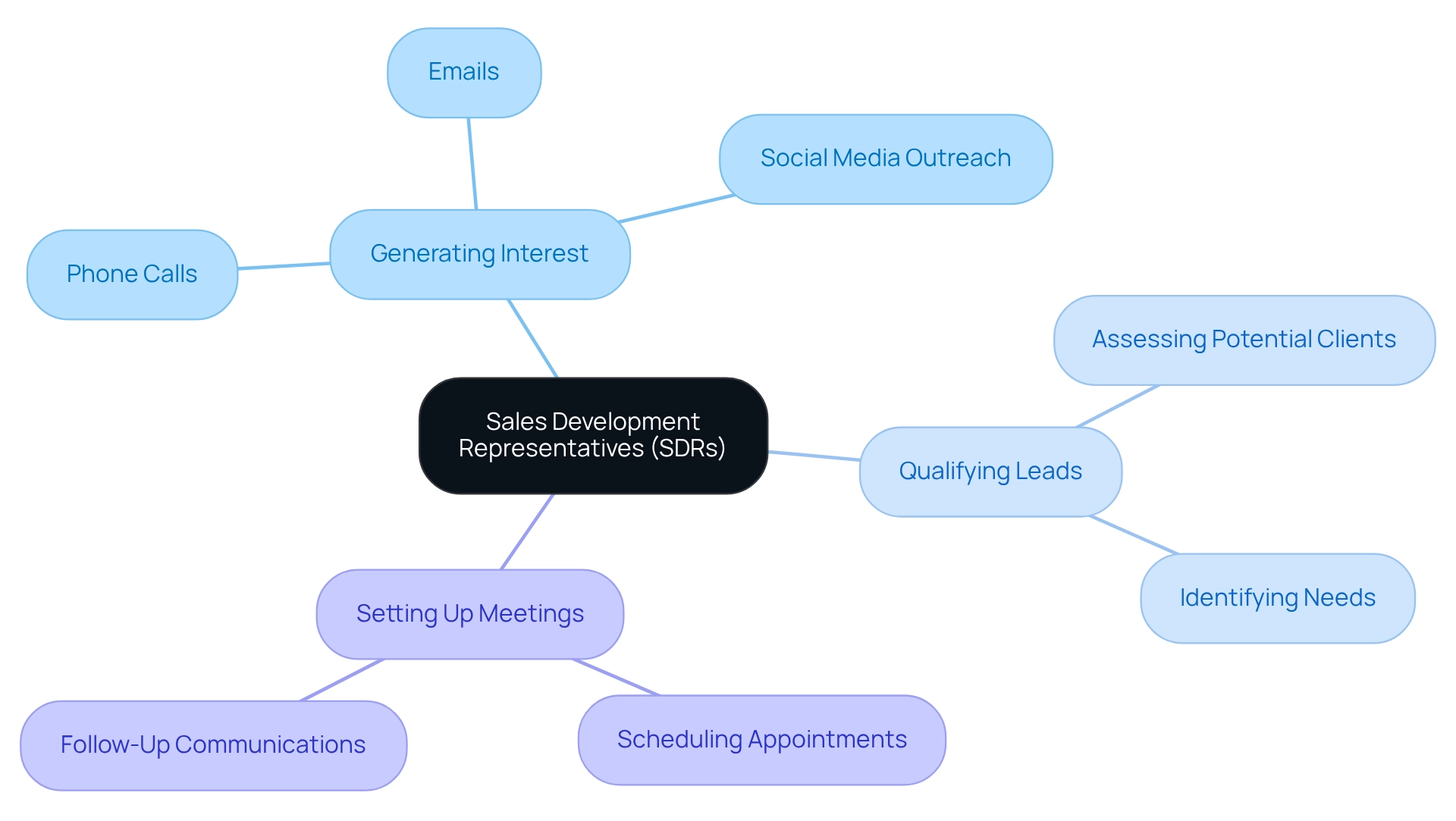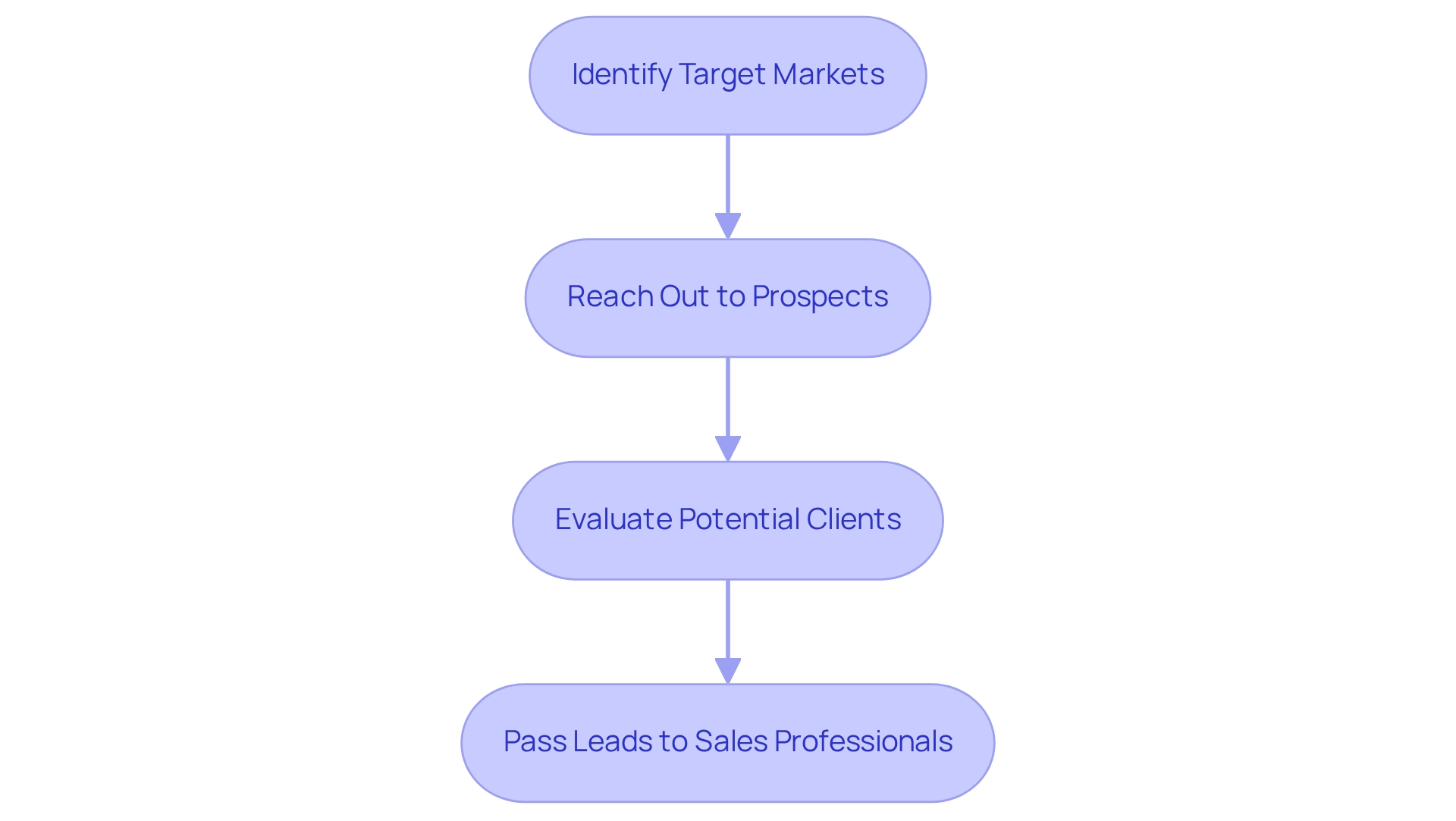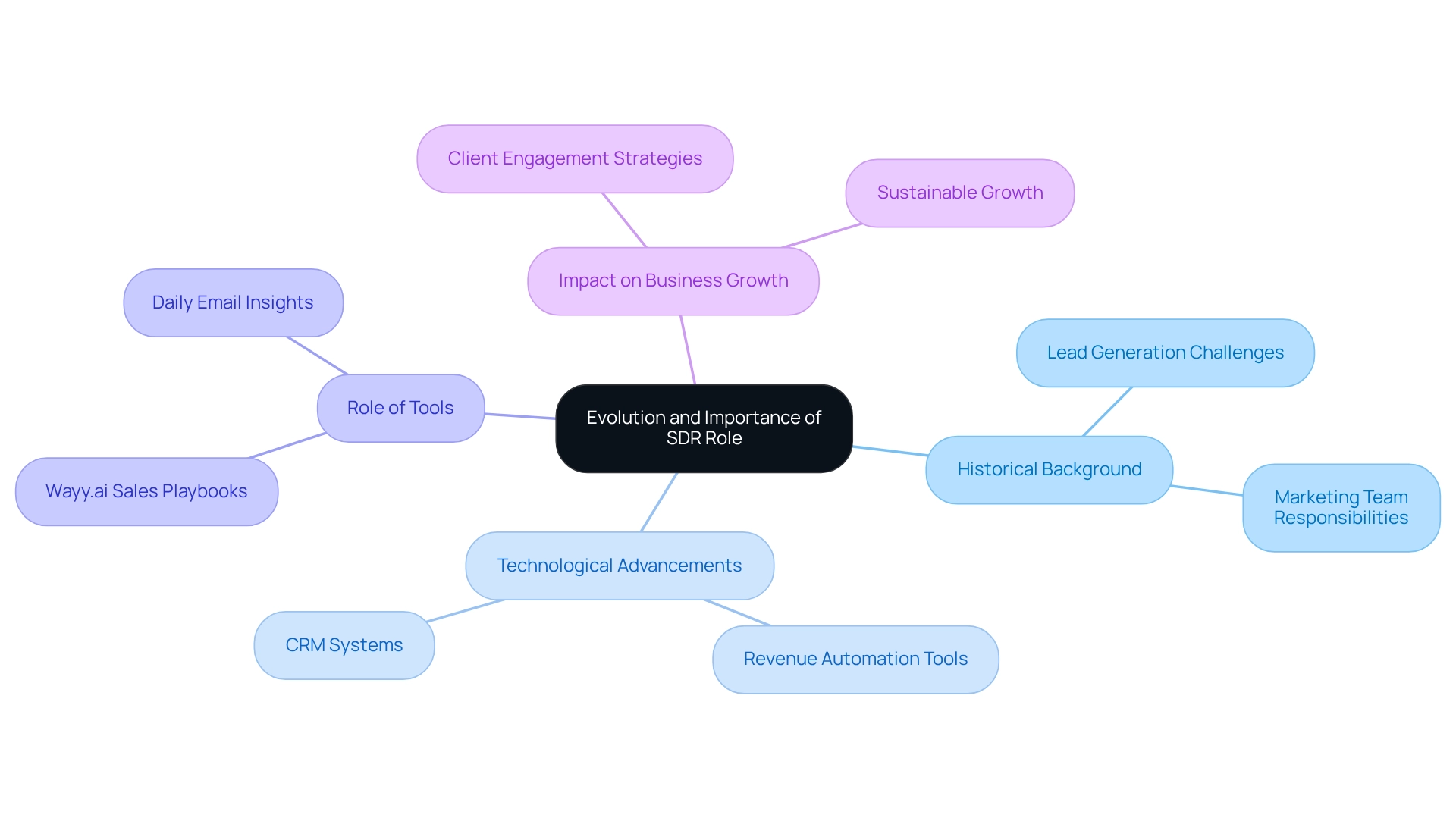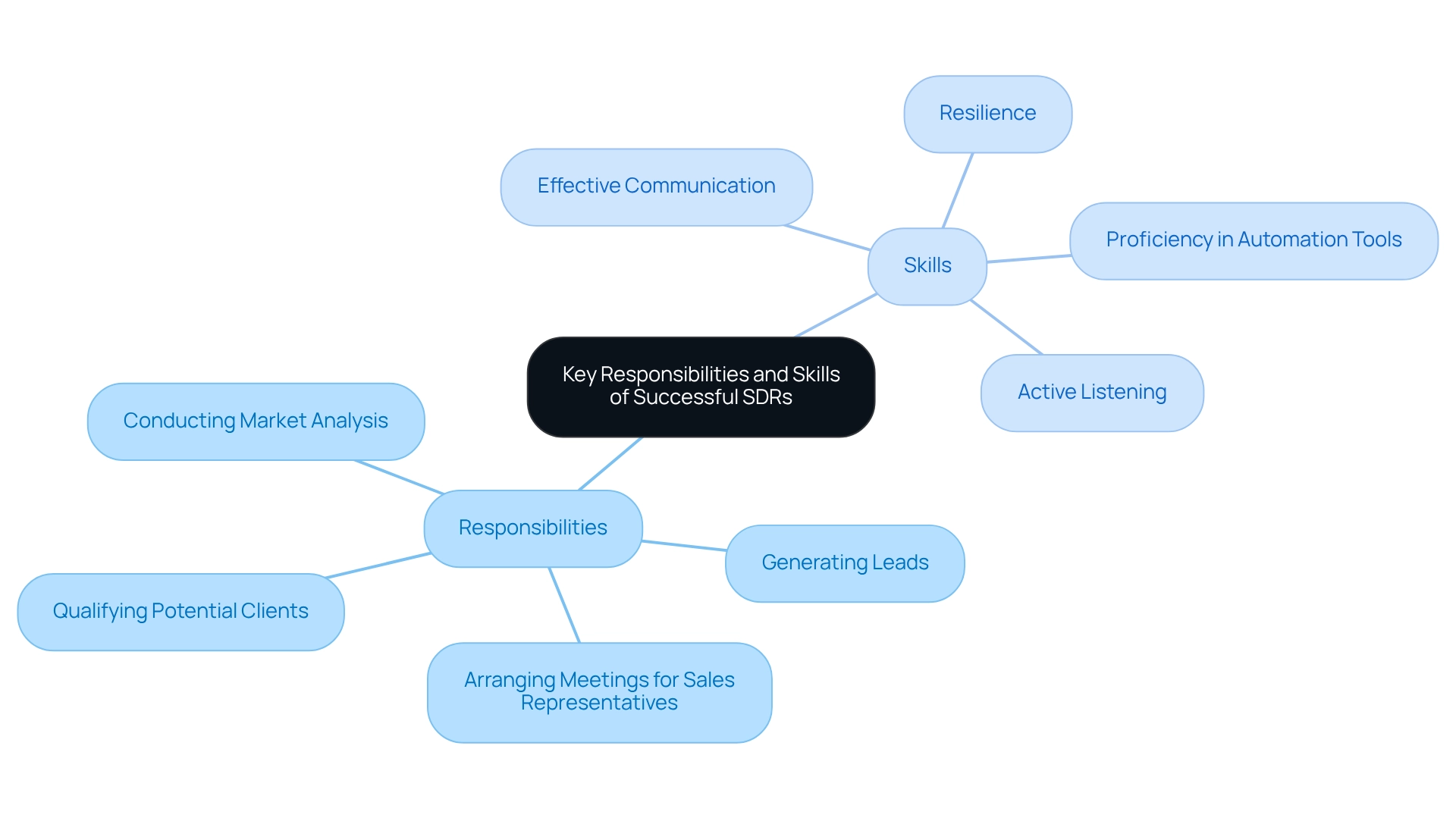Overview
Sales Development Representatives (SDRs) play a vital role in the sales process, and we understand how crucial this can be for your business. By generating interest, qualifying leads, and setting up meetings for sales representatives, SDRs help ensure a robust sales pipeline.
Imagine how much smoother your sales journey could be when initial outreach is managed effectively. This not only enhances efficiency but also boosts conversion rates, allowing your sales team to concentrate on closing deals rather than merely gathering contacts. Together, we can achieve success in navigating these challenges.
Introduction
In the ever-changing landscape of sales, Sales Development Representatives (SDRs) have become vital to effective lead generation and customer engagement. As the initial point of contact between a company and prospective clients, SDRs play a crucial role in identifying and nurturing leads, ensuring a consistent stream of qualified prospects enters the sales pipeline.
With advancements in technology and shifts in buyer behaviors, these dedicated professionals have embraced innovative strategies and tools to enhance their outreach efforts. This article explores the essential functions of SDRs, their importance in the sales process, and the key skills that set successful representatives apart in this continually evolving environment.
Together, we can navigate these challenges and unlock the potential for greater success.
Defining Sales Development Representatives (SDRs)
Sales Development Representatives play a crucial role in the early stages of the selling process, serving as the first point of contact for potential clients. Their primary focus is on generating interest, qualifying leads, and setting up meetings for sales representatives. By reaching out through phone calls, emails, and social media, they discover and nurture opportunities that can lead to meaningful connections.
This position is essential for ensuring that the sales pipeline is filled with suitable candidates, allowing sales teams to dedicate their efforts to closing deals rather than merely gathering contacts. We understand the challenges small business owners face in building their client base, and having dedicated professionals to pave the way can make all the difference. Together, we can achieve success by recognizing the importance of these roles in creating a thriving business environment.

The Role of SDRs in the Sales Process
Sales Development Representatives, often referred to as the sdr full form in sales, are essential in the transaction process, acting as the first point of contact between your company and potential clients. They take on the important responsibility of exploring and identifying target markets, reaching out to prospects, and evaluating potential clients based on specific criteria. By effectively managing this initial outreach, sales development representatives help clarify the sdr full form in sales, ensuring that only the most promising leads are passed on to sales professionals. This not only streamlines the sales process but also allows your sales team to focus on closing deals, leading to improved efficiency and higher conversion rates.
We understand that navigating the sales landscape can be challenging. By having dedicated representatives to handle initial contacts, you can feel more confident that your team is equipped to succeed. Together, we can achieve greater results by fostering a supportive environment that prioritizes your needs and enhances your overall sales strategy.

The Evolution and Importance of the SDR Role
The role of Sales Development Representatives (SDRs), with the SDR full form in sales being crucial, has evolved significantly over the past decade, shaped by advancements in technology and shifts in buyer behavior. Have you ever felt overwhelmed by lead generation and closing deals? Historically, marketing teams were tasked with both, leading to inefficiencies and exhaustion. Thankfully, the advent of revenue automation tools and CRM systems has allowed companies to divide these functions, giving rise to the SDR role.
Today, the SDR full form in sales highlights the essential role of sales development representatives in navigating the complexities of the commercial landscape. They employ data-informed insights to connect with potential clients efficiently. With innovative tools like Wayy.ai, SDRs can streamline client acquisition through one-click sales playbooks. These playbooks simplify the sales process by offering pre-defined steps and resources for outreach, making it easier for you to focus on what truly matters—building relationships.
Targeted outreach capabilities empower SDRs to engage with the right prospects at the right time, enhancing overall engagement. Furthermore, daily email insights from Wayy.ai provide crucial metrics, such as the number of potential clients contacted and those who showed interest, while also tracking improvements in conversion rates. Isn’t it reassuring to know that these insights can guide your efforts?
Their ability to adapt to new technologies and methodologies has made SDRs indispensable in achieving sustainable growth for businesses like yours. Together, we can navigate these challenges and achieve success, ensuring that your business thrives in today’s competitive environment.

Key Responsibilities and Skills of Successful SDRs
Successful sales development representatives demonstrate a unique blend of skills and responsibilities that align with the SDR full form in sales, empowering them to thrive in their roles. They perform essential duties such as:
- Conducting market analysis
- Generating leads
- Qualifying potential clients
- Arranging meetings for sales representatives
These tasks are vital, as they not only drive sales but also help nurture relationships with potential customers.
Key skills for sales development representatives, or the SDR full form in sales, include:
- Effective communication
- Active listening
- Resilience
- Proficiency in automation tools
Imagine how much smoother your sales process could be if your team had a deep understanding of your products and services, along with the ability to analyze customer needs. This knowledge is crucial for engaging prospects effectively.
By honing these skills, SDRs can make a significant impact on their organization's sales performance and contribute to overall business growth. Together, we can achieve success by recognizing the importance of these roles and supporting the development of these essential skills in your team.

Conclusion
The role of Sales Development Representatives (SDRs) is truly vital to the success of modern sales strategies. By focusing on lead generation, qualifying prospects, and setting appointments, SDRs enable sales teams to concentrate on what they do best: closing deals. This thoughtful division of labor not only boosts efficiency but also enhances conversion rates, allowing businesses like yours to thrive in a competitive landscape.
As the sales environment evolves, SDRs have embraced technology and data-driven insights to refine their outreach efforts. With tools like sales automation and CRM systems, they can connect with the right individuals at just the right time. Their willingness to adapt to these advancements is essential in navigating the complexities of today’s sales processes.
Ultimately, successful SDRs possess a unique blend of skills and responsibilities that drive business growth. Strong communication, resilience, and a deep understanding of both the market and your company’s offerings empower them to make a significant impact. As organizations increasingly recognize the value of SDRs, investing in their development will be crucial for achieving sustainable success in sales. Together, we can foster an environment where SDRs thrive, ultimately benefiting your business and its future.
Frequently Asked Questions
What is the role of Sales Development Representatives (SDRs)?
Sales Development Representatives (SDRs) serve as the first point of contact for potential clients, focusing on generating interest, qualifying leads, and setting up meetings for sales representatives.
How do SDRs engage with potential clients?
SDRs engage with potential clients through phone calls, emails, and social media to discover and nurture opportunities.
Why are SDRs important for sales teams?
SDRs are essential for ensuring that the sales pipeline is filled with suitable candidates, allowing sales teams to concentrate on closing deals rather than just gathering contacts.
What challenges do small business owners face that SDRs can help address?
Small business owners often struggle to build their client base, and having dedicated SDRs can significantly aid in paving the way for new opportunities and connections.




